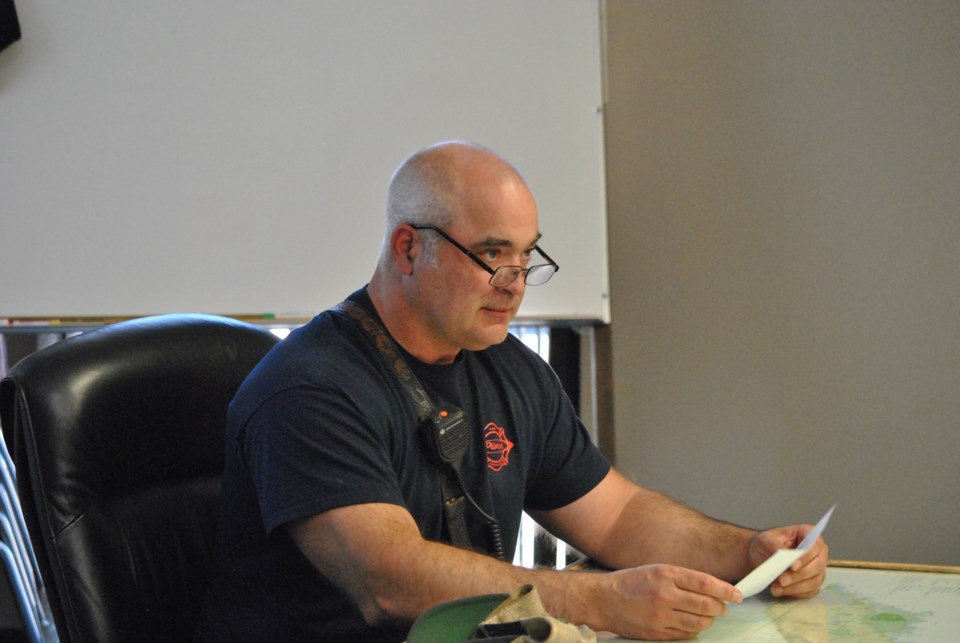BARRHEAD - If there is a positive to be had from this year's extreme start to this year's wildfire season, it is the attention it has brought to firefighters.
More specifically, the need for firefighters.
Barrhead Regional Fire Services (BRFS) chief Gary Hove told County of Barrhead councillors during their June 6 meeting that, for the first time in several months, the department has a full contingent of 40 firefighters.
For most of the year, the department's roster has hovered around the low to mid-30s.
"With all the attention that we've been getting due to all the fires that we've been responding to, I've had three former members come back, and three more have joined up," he said.
Hove also noted that others are expressing interest in joining the department including a husband and wife team with extensive experience (10 years) fighting fires for the province.
In fact, Hove noted the couple came and helped BRFS fight a recent wildfire.
Hove visited council to update councillors about the department's 2023 first-quarter callout statistics from January to March.
However, they were more interested in learning about local firefighters' contributions to the province's wildfire-fighting effort.
Hove noted that four BRFS firefighters are still part of the provincial firefighting effort, along with Engine 33, as part of a strike team based in Peace River.
"The strike team is on standby, waiting to respond to a situation," he said.
Hove said it is the second time BRFS members have joined the team. In early May, the province requested firefighters and equipment to join the Rainbow Lake firefighting effort, but shortly afterwards they were redeployed to the Peavine Métis Settlement and then, finally, the Peace River strike team.
In addition to those crews, BRFS also sent firefighters and equipment to the Lac Ste. Anne Lessard Lake Estate and the Drayton Valley firefighting efforts.
Hove noted that generally, firefighters go for a week at a time before returning home.
"In Drayton Valley, we had a team with Tender 34, which was there for three weeks. We were the last municipal fire department there. They just loved what our members could do with that little truck. It could drive down cat lines. Because it is so light, it wouldn't get stuck," he said.
Coun. Bill Lane asked if the firefighters joined the provincial or other regional wildfire-fighting efforts had any issues or kickback from their employers.
Hove replied no, noting their employers, especially those who work at the Neerlandia Co-op, were very generous.
"They realize the firefighters are helping their community and the province and were granted a leave of absence," he said.
Deputy reeve Marvin Schatz interjected that while it is good to have the ability to send equipment and firefighters to help in other efforts, he received calls from residents concerned that BRFS were sending firefighters and equipment away, potentially impacting local response.
"(At the time we were under a complete fire ban), and yet we are sending guys and equipment elsewhere," he said. "I told them our fire chief would not have sent them if it compromised our fire response. I am hoping that is the case," he said.
Hove assured Schatz that was the case, saying BRFS had the luxury to send firefighters and equipment and at no time did their temporary reassignment jeopardize BRFS' ability to respond locally.
He added that to ensure they had an adequate fire response on multiple occasions, he had to refuse requests from the province for additional firefighters and equipment.
It is worth mentioning that after the meeting, Hove lifted the final fire restrictions, noting BRFS had not responded to a wildfire in about two weeks.
Coun. Walter Preugschas said he was pleased that the fire department was able to help other local departments and the province in their time of need.
"Because next time, we might be the ones that need that help," he said.
Schatz also asked how BRFS firefighters were coping mentally and physically from what was a busy and demanding spring.
"They're good but tired. There were times that they were fighting fires all week, often into the night. Then, in the morning, they would have to go to work and then, on the weekend, have to fight fires some more," Hove responded. "But nothing brings firefighters together is operating at fires. It creates unity."



